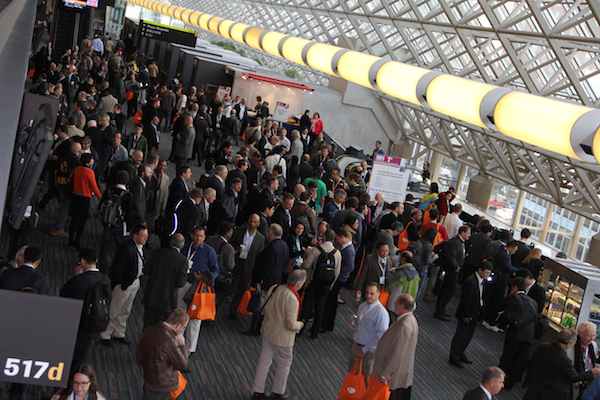
Conference attendees take a break at MS&T13. Credit: ACerS
You already know that MS&T14 is going green in Pittsburgh, Pa. this year.
What you might not know is that in addition to the great presentations and lectures in the vast technical program, the front end of MS&T14 (October 12–16) also will feature a few short courses to help you maximize your learning potential in the Steel City.
The first short course, which will be split between Saturday, October 11 and Sunday, October 12, is “Fundamentals of Glass Science and Technology” taught by Arun Varshneya. Varshneya is professor emeritus of glass science and engineering at Alfred University and president of Saxon Glass Technologies. Among a long list of accolades (which, most recently, include ACerS Distinguished Life Membership), Varshneya is author of Fundamentals of Inorganic Glasses, which course attendees will also receive with their registration costs (bonus!). The course will cover basic glass science and tech to broaden or improve your foundation in understanding glass as a material of choice, including topics like glass science, glass technology and batch calculations, glass melting and forming, glass properties, and elemental fracture analysis.
Two other courses will also be offered on Sunday, October 12. “Recent Innovations in Electroceramics and Their Applications” will be taught by R. K. Pandey, Ingram engineering professor at Texas State University. Pandey will draw on his 30-plus years of teaching experience to highlight electroceramics for their use and impact as integral parts of many emerging technologies. The course will aim to expose participants to the current state of the field, emphasizing practical applications and potential inventions. Sign up for this one and you’ll get the lowdown on topics including recent innovations, interacting forces in electroceramic materials, processing and characterization of materials for low-cost R&D, physical basis for multifunctional materials and multiferroics and their applications, nonlinear dielectrics and magnetics and their applications, and electroceramic applications.
Sunday will also offer “Understanding Why Ceramics Fail and Designing for Safety,” jointly tackled by Steve Frieman and John Mecholsky. Frieman, who formerly headed the Ceramics Division at NIST, is president of Frieman Consulting Inc. Mecholsky is professor of materials science and engineering at the University of Florida. Fracture experts, Frieman and Mecholsky have published a book together titled “The Fracture of Brittle Materials: Testing and Analysis” (unfortunately, you’ll have to buy this one separately). The course will solidify participants’ practical fracture mechanics background, improving understanding of brittle failure and corresponding material design and use.
If one of those topics struck a chord, you can head over to the individual course links above to sign up. If you’re planning on also attending MS&T14 and would like to get your learn on at one of the short courses while in Pittsburgh, you can sign up for the courses along with your MS&T14 registration over here.

